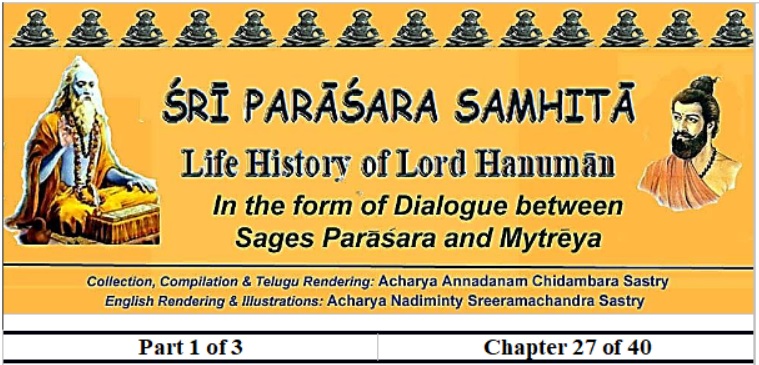
27th Chapter (Saptavimśatitamah Paţalah)
“Description of the Lake Pampā”
(Pampāsarōvarnņnamm)
श्रीमैत्रये :
श्लोक:
स्वामिन्नत्र कृतार्थो हं पराशर जगद्गुरो
तवसन्दर्शनांन्नूनं जगत्कालत्रये पि वा।। 1
Seer Mytrēya:
Lord! Great sage Parāśara! I became auspicious with your divine site, truly. Similarly the whole universe became auspicious in the three times (past, present and future). (1)
सांसारिककथाग्रीष्मसन्तप्तं बहिरन्तरम्
मामसिंचद्भवा न्यस्मात् आव्म्जनेयकथामृतै:।। 2
You cooled my body, that heated up inside and outside due to the summer of the mundane world, by sprinkling on me the nectar (amŗit) of Hanumān’s story. (2)
न केवलमहं तीर्णो दुस्तरं भवसागरम्
भवत्कृपाप्लवेनेदं त्रितयं जगतामपि।। 3
It is not me who crossed this impassable sea of the mundane world. On the strength of the boat of your kindness that the worlds became auspicious. (3)
यस्तु सदाहतो मूढ: त्यक्तवा नाम मनूत्तमम्
सो यं भ्रमति संसारसागरे भ्रमसंकुले।। 4
A foolish one that neglects the best of all mantras, i.e., Your name, is lost in the complex catacombs of the mundane worked. (4)
किंतु पम्पासरस्तीरे हनुमान्मारुमात्मज:
कथ चिक्रीड सामात्य: बालक्रीडाभिरद्भुतम्।। 5
And how Hanumān the son of Wind God is enjoying the child games along with his aides on the bank of Lake Pampā? (5)
कानि दुष्टानि सत्त्वानि शिक्षितानि महात्मना
कानि सत्त्वानि शिष्टािन रक्षितानि महात्मना।। 6
By which great soul (mahātma) evil creatures are punished and noble creatures are protected? (6)
यत श्चान्यच्च कृत्स्नं मे ब्रूहि पराशर प्रभो
अज्ञातं त्रिषुलोकेषु त्रिषुकालेषु वा त्वया।। 7
Oh! Lord! Parāśara! Tell me every other detail in this regard. Tell me every thing that was not known in the three worlds and the three times. (7)
न किंचि द्विद्यते ब्रह्मन् हनुमत्कृपया मुने।
अहो न दृश्यते तृप्ति: आव्म्जनेय कथाश्रुतौ।। 8
Oh! Great sage! By the grace of lord Hanumān, I am greatly satisfied listening to His story. (8)
हनूमत: प्रसादो वा पुण्यश्रीर्वा ममोत्तमा
सत्स³गस्य प्रभावो वा कारणं किन्न बुध्यते।। 9
I can not make out the reason for this; whether it is the benevolence of Hanumān on me or the result of the best of my good deeds or the influence of being amidst noble persons. (9)
शिष्ये मयि कृपां कृत्वा भवत्पादनते नृणाम्
आख्याहि हनुमद्वार्तां सर्वलोकशुभावंहाम्।। 10
With kindness towards me, your pupil serving at your lotus feet as my virtue, tell me the entire subject of Hanumān, that gives auspiciousness to all the worlds”. (10)
इति तद्वचनं श्रुत्वा व्यासस्य जनको मुनि:
ह्रष्टरोमा भवत्स्द्य: हनुमद्भक्त शेखर:।। 11
Listening to those words, instantly delighted sage Parāśara, father of the great sage Vyāsa and the best of the Hanumān devotees, (11)
उवाच वचनं धीमान् मैत्रेयं मुनिसत्तमम्।। 12
And a great intellectual, the best among seers told so the Sage Mytrēya. (12)
श्रीपराशर:
कृतार्थो सि महाभाग मां कृतार्थं करोषि च
यद्विहाय तथा मह्नां मनोवाक्कायकर्मभि:
हनुमत्कथया कालो नीयते हर्निशात्मक:।। 13
Seer Parāśara:
Oh! Sage Mytrēya! You have attained your objective and made me too an achiever of my objective. It is so because our days and nights are being spent by thought, by word and by action with the holy story of Hanumān, leaving everything else aside.(13)
लाके यात्रानुसन्धानव्यग्रभावमनोमृग:
आव्म्जनेयकथाप्रश्नवागुरासंयतो मम।। 14
My mind, always disturbed by matters materialistic, is well kept on a leash by the questions related to the story of Hanumān. (14)
हनूमत: कथाप्रश्न: पुनाति चतुरो जनान्
वक्तारं पृच्छकं श्रोतृन् अनुमन्तारमेव च।। 15
Those answering the questions about the story of Hanumān, those asking, those listening and those permitting the same are divided into four types of pure ones. (15)
धर्माथं काममोक्षाणां चतुर्णा प्रतिभूरयम्
अतो ह मविलंबेन यथामति यथाक्रमम्
हनुमत: कथापुण्यं वर्णयामि महामुने।। 16
The issues of Hanumān is a gurantors of the four individual goals (puruşārthas), namely, righteousness (dharma), honest earnings (artha), desires (kāma) and salvation (mokşa). Hence, Oh! Mytrēya! I will narrate that pious story of Hanumān as much as I know. (16)
अस्ति पम्पासरो नाम महापुण्यजलाशय:
हेमाम्भोरुहराजीभि: विकचाभिर्निरन्तरम्।। 17
The Lake Pmpā
There is pious water body (puņyanadī) named Pampā lake. It always remains with groups of golden lotuses in full bloom. (17)
कूलद्वयसमाकीर्णं मुनिमण्डलमण्डितम्
तीर्थैरमितसंख्याकै: निष्पन्नैर्वालुकांकितै:।। 18
It is well-spread between the two banks, resplendent with groups of visiting sages, with unlimited spring water, sand dunes that are always amenable to happy bath by women, children, adults and middle-aged people. (18)
हंससारसचक्राजलकुक्कुटशोभितम्।
विकसत्पद्भवृन्देषु भ्रमद्भ्रमरसंकुलम्।। 19
Brimming with swans, Indian cranes (sāaras), euddy geese (cakravāka; love-birds) and water fowls; teeming with lotuses in bloom and bees flying around. (19)
हेमरम्भावनच्छन्नप्रान्तदेशं मनोरमम्
शैवालमव्म्जरीलीनमहफणिफणाद्भुतम्।। 20
It is beautiful with parts covered by banana groves, and soft moss; and wonderful inclusive of the hoods of great snakes. (20)
तत्राश्रमे मृगव्राता विहाय कलहंसज:
विरोधिनो पि पतगा: सखायस्सहजा यथा।। 21
There, even animals and birds are without the natural enmity between various species. (21)
तरवो पि सुपुष्पाढ्या सर्वर्तु फलसम्पद:
बिसप्रसूनसव्म्चार: तत्र हंसादिनिस्वन:।। 22
There trees flower and bear fruit in all the seasons. Swans tend to mate as they roam amidst the lotus stralks and flowers. (22)
आह्रयन्तीव कन्दर्प निनदा: कलकलारवै:
सकृत्परभृतालापै: कामबाघाश्चकासते।। 23
Although inviting the romantic ways of the cupid Manmatha, the cuckoos incessantly fill the area with their ‘coo coo’ song expressing their mating instinct. (23)
मत्तषट्पदसव्म्चारा: कन्दर्पजयशब्दवत्
श्रूयन्ते विततास्तत्र मलयानिलशेखरा:।। 24
The sound of the flying around scores of bees in rut is heralding the win of love along with the gentle breeze. (24)
यूनां प्रणय संरंभा: तत्र पुण्यसरोवरे
क्षणाच्छिथिलतां यान्ति नीहाराइव भास्करे।। 25
Like the frost getting melt before the Sun, the love affairs of youth are getting satiated in a trice in that holy lake. (25)
मुग्धा युवतय: पुण्यं पीत्वा तज्जलमुत्तमम्
कुल्येयमिति मन्यन्ते स्वर्गादमृतवाहिनी।। 26
Beautiful young damsels were confused into believing the sacred and the best of waters (of that lake) to be a channel of the nectar stream (amŗitavāhiņi) of the heaven. (26)
रमन्ते देवगन्धर्वा: किन्नरास्साप्सरोगणा:
तत्र केचिन्महात्मानो मन्त्रसिद्धास्तु वर्णिन:।। 27
Enjoying themselves there gods with the heavenly danseuses, gandharvas the rich demi-gods and kinneras the itinerant demi-gods. (27)
स्वरूपध्यानमास्थाय ब्रह्मानन्दानुभूतय:।। 28
They are enjoying grandly with each other’s bodily contacts. (28)
गृहिणस्तु सदाचारा: अग्निहोत्रपरायणा:
स्वाध्यायनिरताश्चासन् आचरन्तो तिथिक्रिया:।। 29
Householder family people there follow all the good traditions, perform regular fire sacrifices, recite their respective branches of Vēda and perform ordained decencies for the guests. (29)
वानप्रस्थास्तु मुनय: चतुष्पावकमध्यगा:
ललाटान्तप मार्तण्डा: तप्यन्ते दुश्चरं तप:।। 30
There the current forest-resident (vānaprastha) elderly sages keep on performing stringent penance sitting between fires in all the four directions with the harsh sunlight falling on their foreheads (pańcāgni). (30)
यतयो पि महात्मानो निरस्तद्वैतभावना:
विहितप्रणवाचारा: मन्यन्ते स्वपरं सदा।। 31
Even the greatsouled strict ascetics forget their dualism (believing in duality of soul of self – Supreme Soul) and, leaning to be non-dualists (soul of self and Supreme Soul are one) and uttering the cosmic ‘Ōmm’, they started feeling the Supreme Beeing (Paramāma). (31)
एवं सर्वसमृद्धे स्मिन् पम्पासरसि पावने
हनूमान्सपरीवार: विहर्तुं कृतवान् मन:।। 32
Arrival of Hanuman at Pampā Lake
At that richly endowed Lake Pampā, Hanumān wanted to roam around happily with his family. (32)
गन्धमादनशैलाग्रस्वर्णरम्भावनाश्रयात्
उष्ट्रमारुह्रा हनुमान्हेमास्तरणभूषितम्।। 33
At the golden banana grooved top of the Mount Gandhamādama, Hanumān mounted a golden rug covered camel (His vehicle). (33)
नवरत्नांचितस्वर्णकिंकिणीजालशोभितम्
मव्म्जीरकल्पनादेव समाहूतसरच्छदम्।। 34
Radiant, wearing tiny golden tinkling ornamental bells studded with nine types precious stones, with unexplainable sounds emanating from.its ornamental leg rings and with a soft and inviting saddle, (34)
प्रलंबि चव्म्चलोष्ट्राड्गं तीक्ष्णकण्टकखादिनम्
दीर्घग्रीवं महाकायं ऊध्हर्वपृष्ठसुवालधिम्।। 35
With its constantly moving hump that leans to one side, a long neck, sturdily built, a high rump, good tail well built, and eating sharp thorns. (35)
क्वणितस्वर्णरत्नाढ्यं हेमाचलसमुन्नतम्
अरोगमजरं पूतं द्वादशाब्दं मनोजवम्।। 36
Decorated with musical ornaments of gold studded with precious stones, tall like the Mount Mēru, free from diseases and old age, pious, aged terlve years and capable travelling with the speed of thought. (36)
शिरीषषुष्पमृदुलसर्वावयवशोभितम्
गंधमादनशैलस्य मुनेरत्यद्भ तोद्भवम्।। 37
It was divinely born in the river of the Mount Gandhamādana, every part of its body is soft like the Acassia (śirīişa; Acassia sirissa) flowers. (27)
शेषाहिफणिमाणिक्यंतेजपुंजमिव स्थितम्
आजगाम कपिश्रेष्ठ: पंपातीरं मनोरमम्।। 38
Mounting His vehicle camel that is like the precious stones on the hoods of the first great serpant Ādiśēşa, Hanumān the best of the monkey creed, came to the shore of Lake Pampā. (38)
छत्रंधर्ता सुषेणो वै मैंदनीलौ तु चामरौ
मागधो मागधाचार: पुरोग।। 39
(Aides) Suşēņa held the decorated umbrella, while Mainda and Neela held the hand fans. Māgadha sang adulatory hymns. Gandhamādana was walking in the front. (39)
विविधं द्विविदो वाची श्रावयत्येन मंजसा
पवन: पादुके गृहन् पदाभयासं निरीक्ष्यते।। 40
While Dvividha carried on discussions on different issues, Pavana waited with the footwear for Hanumān to start walking. (40)
हितमाचरते वृद्धो जांबवान् नीतिमाचरन्
विनतो विनयग्राही भुजालंबं ददौ तथा।। 41
As deemed fit for his elderly age and following the eticacy and tactics, the lord of bears Jāmbavant was consulting (with Hanumān) about good and ideal thoughts. Humble Vinata was providing the shoulder support. (41)
अन्ये वानरमुख्याश्च गवाक्षप्रमुखा अपि
अनुजग्मु: कपिश्रेष्ठं अतिसंकटगामिन:।। 42
Though it was tough, Gavākşa and the other monkey aides were following Hanumān the best among the monkeys. (42)
कीर्तितान्यपदान्येष: गंधमादन वंदिनाम्
सुखं सुश्राव हनुमान् मधुवाणीं पुन: पुन:।। 43
Hanumān was listening happily again and again the sweet words of greatness of His dynasty being heralded by Gandhamādana. (43)
एवं कृतसुखालाप: त्रूण्व न्मध्येपदं हरि:
अपि गम्य बिलंबेन क्षणात्प्राप सरोवरम्।। 44
Though exchange of all these good words took some time, Hanumān reached Lake Pampā in no time. (44)
आसाद्य हनुमान्पंपां ददर्शैकाग्रमानस:
विस्मयं परमं लेभे सरोवरनिरीक्षणात्।। 45
Reaching the Lake Pampā, Hanumān observed it keenly and greatly surprised. (45)
सरोदर्शनफुल्लास्यं हनूमंतं कपीश्वरम्
उवाच वचनं धीमान् जांबवान् सुविचक्षण:।। 46
To the Monkey Lord Hanumān with His face blooming on seeing the Lake Pampā, wisely thinking scholar Jāmbavant said so. (46)
सुवर्चलापते! पश्य! पंपाया: रमणीयताम्
कादंबनिकुरंबाब्जं व्योमेव विततं सर:।। 47
Beauty of Lake Pampā
‘Oh! The Lord of Suvarcchala! Observe the beauty of the Lake Pampā. It is looking like the sky with scores of swans with grey coloured beaks, legs and feathers. (47)
श्वेतगुंजा विराजन्ते तारा इव सुनिर्मला:
शैलावालपटला भांति श्यामला इव नीरदा:।। 48
White bunches of flowers or white gunja (Crab’s eye; Abrus precatorius) seeds are shining like clear stars.The duck-weed on the water is looking like dark blue coloured clouds. (48)
सप्तपर्णच्छदा यस्मिन् सपुष्पा: प्रतिबिंबिता:
सप्रर्षय इवाभांति स्तोत्रानतय: पुरा।। 49
With reflected images in the in the Lake Pampā, the flowering seven-leaf banana trees are making one think that the Seven Great Seers (saptaŗşi) are rendering invocative hymns.(49)
ज्वलत्पावकसंकाशो रक्तोत्पलसमुच्चय:
अंगारक इवाभाति शुभस्थानगतो महान्।। 50
The burning-flames like of red lotus groups are looking as though the Mars (Mangal) planet is strengthened by being in an auspicious zodiac sign.(50)
उदेति पुण्डरीकालि: अदभ्रविशदप्रभा
प्रभातसममयो व्योम्नि गुरोरेव महाद्युति:।। 51
The groups of white lotuses are looking like the expansive radiance of the Jupiter (Guru) planet in the sky early in the morning. (51)
हेमांबुजवनं पूर्वं उद्बुद्धह्र्दयं पुरा
उदेति मण्डलं भानो: तथा रुणपुरस्सरम्।। 52
Groups of golden coloured lotuses in full bloom seen in the forreound are looking like the golden hinged red seen just before the sunrise. (52)
पर्यंतविसरध्वांत विध्वंसनविचक्षण:
शुक्रोदय इवाभाति कुमुदानां महोदय:।। 53
Capable of driving away the darkness, the lotuses of that place are shining like the rise of Venus (Śukra) planet. (53)
शनैश्चरति पद्मेषु मधुलोभान्मधुव्रत:
शनैश्चर इबाश्चर्याच्छुभराशिगतास्पद:।। 54
The greatly honey-fond bees are visiting the lotuses again and again, reminding one of the entrance of the Saturn (Śani) planet into a favourable zodiac sign. (54)
मुक्तामणिमयस्सूक्ष्म: सर्पमौलिप्रतिष्ठित:
चन्द्रपुत्र इबाभाति गगनाड्ग णराजित:।। 55
The tiny pearl like stone (muktāmaņi) on the hoods of snakes shine like the planet Mercury (Budha). (55)
इदं मृणालमाभाति लूनपुष्पमुखं द्विजै:
अदृश्यमान पूर्वाड्ग केतुच्छायाग्रहो यथा। 56
The fragrant lotus creepers (stalks) with the flowers cut away by swans or Brahmin people, without head (flower), is sining like the shadowy planet Kētu. (56)
ग्रसमान: फणीशं खं शुभ्रमूषकसंभ्रमात्
राहुग्रस्तो यथा चन्द्र आभाति विवृतानन:।। 57
The snake about to grab a shell confusing it to be a white mouse, is looking like the planetlet Rāhu about to grab the Moon with fully open jaws. (57)
चक्रश्चन्द्रमंस मेने शंखदर्शनविह्रल:
फणितद्गृहवेलायां भजन्ति प्रीतिमुत्तमाम्।। 58
A love bird moving around the Moon (in the same plane) is looking like the planet Rāhu reached the Moon. (58)
विष्टब्धनालहेमाब्जं समारोहति हंसक:
भक्तनायकपार्थस्य वैजयन्त्यां भवान् यथा।। 59
A swan sitting on a sturdy golden lotus is looking as though You, Lord Hanumān! are riding the flag banner on Arjuna’s chariot. (59)
नीलोत्पलगुणो भाति रक्तोत्पलगुणास्पद:
आरूढ़गरुढारूढ: श्रिय:पतिरिव प्रभु:।। 60
The black lotus surrounded by red lotuses is shining like Vişņu riding his vehicle Garuda, the great eagle. (60)
नलिनीनयनाकारै: नलिन्नै र्लीनकांतिभि:
सुवर्चलेव कल्याणी भवंतं प्रेक्षते मुहु:।। 61
With radiance in them, the lotuses of this lake seem to be looking at you, Oh! Suvarcchala! (61)
पम्पेयं वीचिबाहुभ्यां कस्यैव पितरं स्वकं
चिरात्समागतं बन्धुं भवन्तमुपगूहति।। 62
Oh! Hanumān! This fatherly looking Lake Pampā seem to embrace you with its waves like you are its long lost relative on visit. (62)
पूर्वमेवेयमत्यर्थं दर्शनीयगुणान्विता
अधुना तु विशेषेण भवदागमनात्प्रभो।। 63
Though the lake is is very much worth seeing as such, it has become more so by your visit, Oh! Lord! (63)
नीरन्ध्रविटपच्छाया: तरवो बहुपल्लवा:
युगपन्मधुरास्वादै: फलै: पुष्पैश्च संवृता।। 64
The trees here are very shady. Full with fresh shoots and richly laden with sweet edible fruits and great flowers. (64)
उपघार्य तथा गुह्मा तरुणी सर्वतो मधु
संगृहा फलपुष्पाणि शाखागै्ररवरोहति।। 65
Fruit and flower honey filled by Vasanta (spring) is dripping from its branches, as though waiting to be tasted by you. (65)
विरोधिनो पि सम्भूय कन्दर्पाधिकृता इव
तरवस्तन्वते रम्यं पम्पासरोवनं तथा। 66
Even undesirable trees are joining them as though inviting Manmatha (cupid) with their splendour. Also the forest around the lake is adding to its beauty. (66)
अन्तराबहुत्वेन क्लिश्यमानस्थलान्तरे
गणो पि योगिनामत्र मन्त्रसिद्धिं तु विंदति।। 67
Meditating sages (Yōgis) that face various difficulties elsewhere, are able to perform sacrifices and acquire achievement of the mantra (mantrasiddhi) here freely. (67)
पीनापीनभरा गावो दुह्मान्ते क्षीरसम्पद:
शालयस्तु शिखाग्रेण भवंतं प्रणता इव।। 68
Cows with big udders are giving lots of milk resulting in milk sufficiency. The paddy crop is bowing to You with its heavy ear-heads. (68)
चिरं त्यजति वंध्यत्वं तरव: पशवो पि वा
प्रसूनै: प्रभवैर्वापि भवदागम्वैभवात्।। 69
Oh! Hanumān! By the grace of your visit, infertility is lost among trees and cows, they giving, respectively, flowers and calves’. (69)
इति निवेदितमुत्तमसंपदं
सपदि जांबवतो ह्रदि भावयन्
अनुमुमोद गुणग्रहशेखर:
त मुपयुव्म्जितवान् कपिशेखर:।। 70
As the keen observer Jāmbavant was praising the virtues and riches of the lake, Hanumān, the best among monkeys absorbed that information. (70)
तदनु जाम्बवतीपितरं वच:
पवनसूनुरवोचत मंत्रिणम्
कति दिनानि वसाम सखे! वयम्
सरसि सर्वसमृद्धिमनोहरे।। 71
Then said Hanumān! to the minister Jāmbavant, “Oh! My friend! How many days should we stay at this charming lake?” (71)
अनुवदन्ति परिश्रममाहितम्
कपिकुलानि फलांबुनिषेवणै:
परिह्रातान्यभयं तु सदाज्ञया
वद सखे विहरन्तु निजेच्छया।। 72
Oh! Jāmbavant! Let our entire monky warriors satiate their thirst and hunger with the water and fruits and rest. By my command, they may roam around freely without any fear. Tell them this. (72)
यथा न वारयति मुनी्रद्रमण्डलम्
चिरं कृतावासमिहाश्रमोत्तमे
तथा चरेयु: दृढसत्त्व विक्रमा:
विमृश्य शाखामृगयूथपास्सखे।। 73
Oh! Dear friend! Let our great valourous monkey warriors may move around without causing any hindrance ro rhe pious seers staying in the hermitages here for long”. (73)
इति निदेशममुष्य वितीर्य वै
करभडिम्भतलादवतीर्य स:
भुवमगात्पनसाद व लंबितो
द्विविददर्शितगम्ययपथ: पुर:।। 74
Thus, commanding, Hanumān dismounted the camel and as Dvivida was showing the way and Panasa and Ańgada guarding on sides, He entered the pleasant water of the Lake Pampā. (74)
इति श्रीपराशरसंहितायां श्रीपराशरमैत्रेयसंवादे पम्पासरोवर्णनं नाम सप्रविंशतितम: पटल:
Thus ends the 27th Chapter, entitled “Description of the Lake Pampā” (Pampāsarōvarnņnamm)
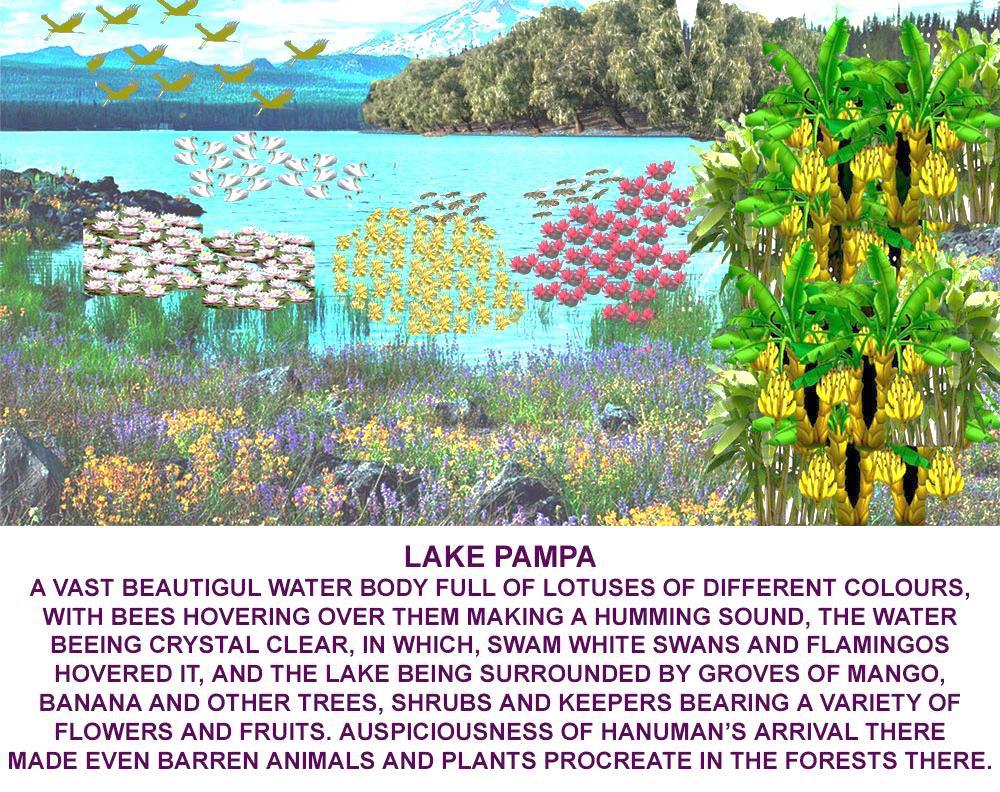
![]()

Click here to visit the Contents of the Part 1.
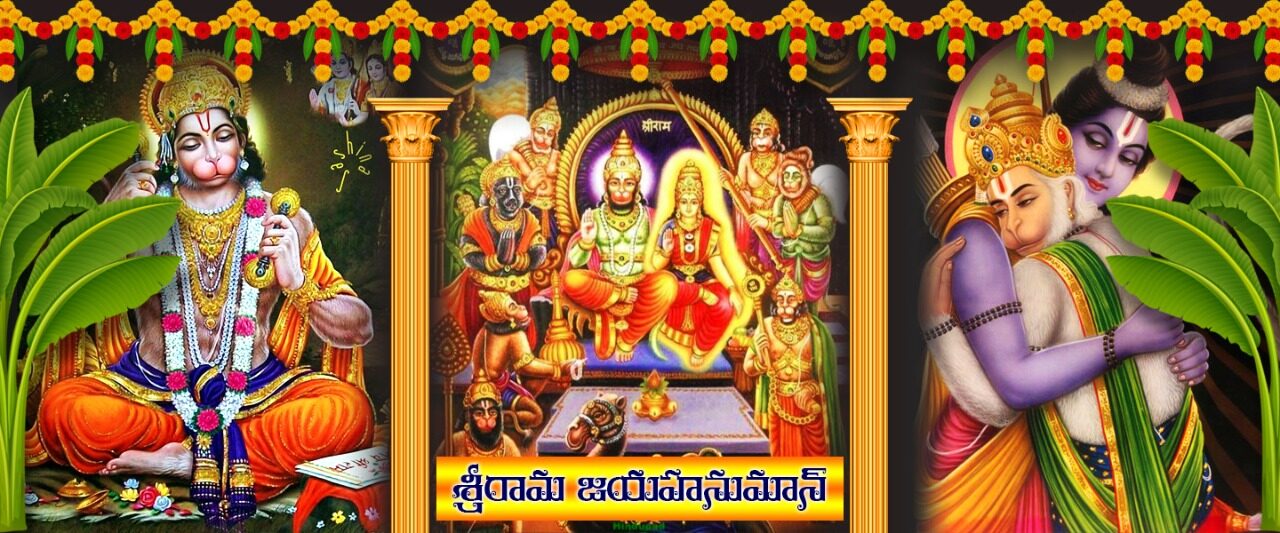
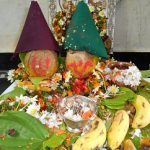

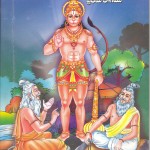



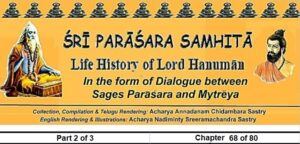
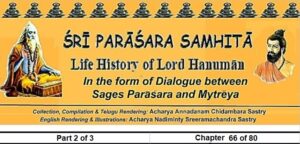
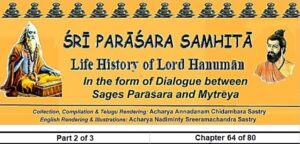
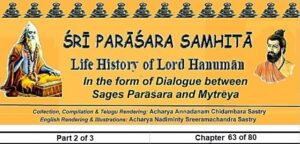
Be First to Comment